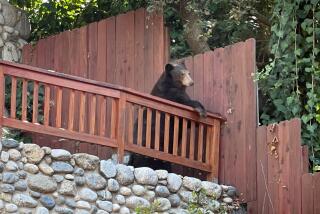Opponents Target Bear-Hunting Boom
- Share via
SPRINGFIELD, Mass. — John Carpenter points his high-powered rifle at the bear, no bigger than a big man, clutching and helpless about 30 feet up a tree above six yapping dogs.
This bear wasn’t going anywhere--now or ever. There was time for everything: to tie the dogs out of harm’s way, to line up a clean shot, to gently squeeze the trigger.
Branches crack, a heavy thud jars the Berkshire Mountain ravine, and the 308-pound bear lies lifeless in a bed of dead brush, a bullet in the head.
Massachusetts hunters, including Carpenter, killed a record 134 bears during the 12-day fall season, nearly doubling the previous high of 68 in 1992. In New Hampshire, state wildlife regulators closed their season almost a month early to stop an already record kill of 461 bears.
For all their unending feuds, many hunters, conservationists and state wildlife regulators now agree on something: Bear hunting is booming in New England and many other parts of the country.
“It wasn’t that long ago that black bears were considered a varmint. Now bears are regarded as a big-game species,” said Charles Bridges, chief of inland wildlife for New Hampshire.
Saying too many hunters now seek trophies instead of challenges, alarmed conservationists are pushing a wave of state and federal initiatives to ban what they view as some of the worst abuses: using bear-tracking hounds, often wearing radio collars; attracting bears with sweets and other bait; and selling the bear’s gallbladder for its bile, which is prized as a traditional Chinese medicine.
“Basically, he’s become a commodity now,” said Jan Turnis, a staff member of the conservation group Bear Watch.
Wayne Pacelle, vice president of the U.S. Humane Society, said radio collars, which signal the location of dogs when they have chased a bear up a tree, add efficiency--if not sport--to the hunt. “Shooting a bear from a tree is the moral and sporting equivalent of shooting a bear from a cage at the zoo,” he said.
Many bear hunters scoff. Carpenter, 19, just shrugs: “I guess I was brought up hunting since I was a little kid, and I just go out. When we kill it, we eat it. It doesn’t go to waste, so I don’t see anything wrong with that.” He said dogs give the hunter more time to decide whether he wants to pass up an individual bear, such as a female with cubs.
But, after victories in Colorado and Oregon, conservation groups have collected enough signatures for preliminary approval to propose on the 1996 ballot a legal ban on hunting with dogs and bait.
Aaron Medlock, a leader of the petition drive, says the bans would help crack down on poachers, who favor the surer methods of hunting with dogs and radio equipment.
Although black bears, the predominant target of U.S. bear hunters, are far from an endangered species, federal officials view North America’s estimated 600,000-member population as threatened in some areas, such as Louisiana. About 40,000 are legally killed each year by hunters.
John Neal, a senior special agent for the U.S. Fish and Wildlife Service, says the overall population is still stable.
In Massachusetts and New Hampshire, state wildlife officials even chalk up the recent heavy kills to growing bear populations, coupled with a summer drought that flushed out some animals.
But Peter Knights, co-director of the Investigative Network, a nonprofit group that does undercover research on the bear-parts business, fears that the often-illegal trade will someday threaten the very existence of black bears in this country, as he says it has in parts of Asia.
“This business is the same business that destroyed the rhino and tiger populations,” Knights said. “This time, I don’t want to wait until there’s that few bears left.”
With higher numbers of Asian immigrants in some American cities, bear gallbladders also have found markets in this country. In September, four Chinese were charged in Los Angeles with trying to smuggle in about $2 million worth of bile, authorities said.
Bills before Congress would make it illegal to trade in bear gallbladders, though some states have already banned it.
But even dramatic anti-poaching sweeps across the nation several years ago, with dozens of alleged poachers arrested in some cases, have failed to stop illegal bear hunting.
More to Read
Sign up for Essential California
The most important California stories and recommendations in your inbox every morning.
You may occasionally receive promotional content from the Los Angeles Times.













